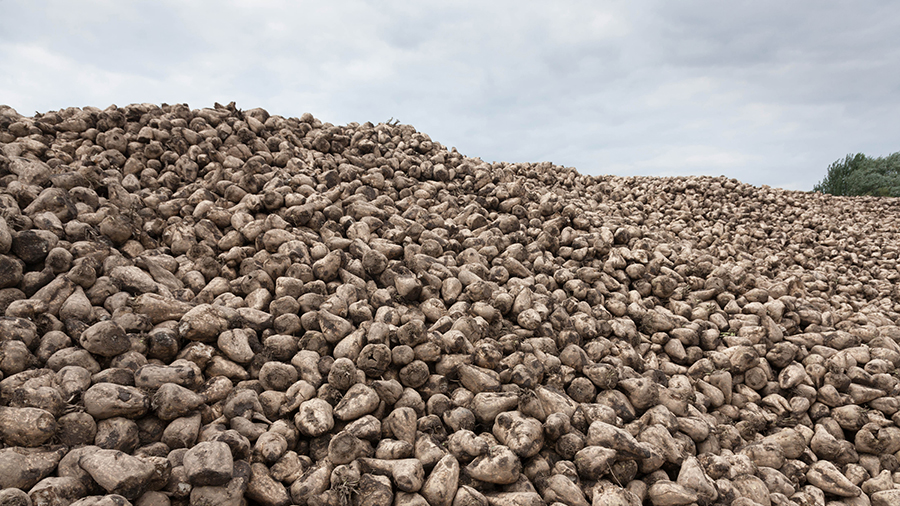Advertiser content
Sugar beet yields to average 80+ t/Ha
Provided by
As the sole processor of the UK’s beet sugar crop, we work in partnership with over 2,500 growers and our customers to deliver a world-class product that is made to the highest standards every day. We are the leading producer of sugar for the British and Irish food and beverage markets, processing around eight million tonnes of homegrown sugar beet and producing up to 1.4 million tonnes of sugar each year.
 2021/22: a reversion to normal yields expected to exceed 80t/ha on average © British Sugar
2021/22: a reversion to normal yields expected to exceed 80t/ha on average © British Sugar The 2021/22 campaign is expected to deliver average sugar beet yields in excess of 80 t/ha, a significant increase on 2020, due to ongoing developments in seed technology and genetics, a good growing season, and near-perfect conditions for crop recovery.
British Sugar is forecasting average sugar beet yields to be in excess of 80t/ha for the 2021/22 campaign – a reversion to normal yields – with crops performing better than many first anticipated.
“The 2021 sugar beet crop started with a delayed drilling window followed by a prolonged cold weather front delaying establishment, but it has shown great resilience,” said Andrew Dear, Head of Agriculture (Bury and Cantley) and National Seed Manager.
“When we reached June the weather warmed up and the crop motored all the way through the summer.”
“We’re seeing good root weights and as we move through campaign, particularly in the past few weeks of harvest, the sugar percentages are continuing to rise,” explains Andrew.
“This is mainly due to the mild weather; and we haven’t had rain in excess, which has led to good growing conditions.”
Lifting conditions have been good, too. “We have had almost perfect harvesting conditions, which means the crop recovery is a lot better,” he adds.
British Sugar is expecting this year’s crop to reach around 80t/ha. “It’s looking really promising at the moment with a reversion to normal yields,” said Andrew.
Virus pressures
Although there was a derogation issued for Cruiser Force to control virus yellows this year, it wasn’t necessary.
“The cold winter meant the aphid kill was high, so in turn that meant the Rothamsted virus yellows model – which forecasts the virus incidence in the crop – was low.
“As a result, the derogation was not triggered, and we didn’t use neonicotinoid seed treatments.”
Growers should have confidence in the Rothamsted model, he adds. “The prediction it gave on 1 March 2021 turned out to be very accurate.
The model has 58 years of data which is very robust; it predicted we would have relatively low levels of infection and that’s exactly what we have seen.”
The 2021 crop has been a lot cleaner too with very little foliar disease. “Last year we had virus yellows infections coupled with secondary infections of Cercospora, but we haven’t seen that much this year at all.
The canopy is much healthier which means the crop has put on weight the whole way through the autumn,” said Andrew.
Seed technology
The first sugar beet variety which is partially tolerant to virus yellows is now available for the 2022 crop giving growers a degree of security and another option for next year.
“We also have some excellent new varieties coming onto the Recommended List. On average we usually see a 2-2.5% yield increase year-on-year.”
In addition, Germains’ Enrich 200 seed treatment gives a 1.4% yield increase over the Enrich 100 treatment. “We will also offer a KWS pellet called EPD2, which is similar to the Enrich 100 performance.”
There are also SMART varieties – available from KWS – which work in conjunction with Conviso herbicide. “It offers new chemistry to control weeds,” says Andrew.
“This is useful in situations where there have been very high infestations of weed beet which suppresses yield because of competition with the commercial crop.
Andrew added: “It’s good news for growers where historically it was not economic to grow beet because fields are heavily infested with weed beet; it gives the option to bring that land back into beet again.”
Case Study: Scott Oldroyd & Co
Scott Oldroyd & Co are growing 3,100t of sugar beet this year near Wisbech, Cambridgeshire. Jonathan Quail of Scott Oldroyd & Co said:
“With the disappointing outcome of the 2020 crop due to low yield, Virus Yellows, and drought, looking at the 2021 crop we took a different approach to growing sugar beet, knowing we wouldn’t have neonicotinoid seed treatment,” said the farm’s contract decision maker, Jonathan Quail.
“In 2020 our yield was just over 60t/ha when we normally average 100t/ha. So far in 2021 the farm has lifted 17.57ha, giving an adjusted yield of 2,020.14t or 114.97t/ha, with an average sugar content of 17.85%.
“This tonnage came off two fields, and the 10ha field achieved 121t/ha. We are hoping to lift the remainder of the crop at the end of the first week of December.”
For more information, contact British Sugar:
T: British Sugar Grower Services freephone 0800 090 2376
E: agriculture@britishsugar.com W: britishsugar.com
